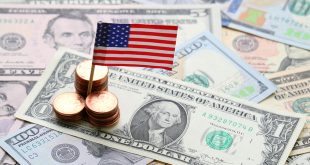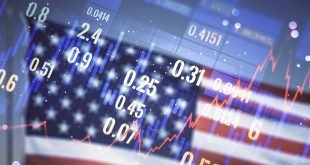The euro plunged to a two-year low against the dollar on Thursday, as comments by European Central Bank President Christine Lagarde were taken as a sign that the bank will not be in a rush to raise interest rates.
The euro fell to $1.0758, its lowest since April 2020.
Lagarde said there was no clear timeframe for when the rate hike would start, adding that it could be weeks to several months after the stimulus packages are over.
“We will deal with interest rates when we reach that stage,” she said.
The euro also fell against the pound to its lowest level in a month, and in the latest trading, it fell 0.4 percent to 82.85 pence.
In the late-day trading, the dollar index, which measures the performance of the US currency against a basket of six currencies, rose 0.8 percent to 100.57 after earlier reaching 100.76, the highest level since April 2020.
After data showed that US retail sales rose in March, the dollar extended its gains, helped mainly by higher gasoline and food prices.
The yen caught a little breath of losses and made a limited recovery from the lowest level in 20 years recorded against the dollar. In the latest trading on Friday, it settled at 125.80 yen.
The data published by the UK’s Office for National Statistics revealed that annual inflation, as measured by the Consumer Price Index (CPI), jumped to 7% in March from 6.2% in February. This print came in higher than the market expectation of 6.7%. On a monthly basis, CPI arrived at 1.1%, compared to analysts’ estimate of 0.7%.
The annual rate of US inflation, as per the Consumer Price Index (CPI), came in at 8.5% in March, slightly the median economist forecast for a reading of 8.4% and higher versus February’s YoY rate of 7.9%. The MoM rate of inflation according to the CPI came in at 1.2% MoM, in line with the median economist forecast for a reading of 1.2% and above versus February’s 0.8% MoM reading.
US Retail Sales rose at a pace of 0.5% MoM in March, a little less than the expected pace of 0.6% and a slowdown versus the previous month’s 0.8% pace, data released by the US Census Bureau on Thursday revealed.
ECB
The European Central Bank left its benchmark deposit rate unchanged at -0.50% on Thursday as unanimously expected by analysts. The central bank also reiterated its guidance that net asset purchases (Quantitative Easing or QE) should end in Q3.
In her usual post-European Central Bank policy meeting press conference, ECB President Christine Lagarde said that the bank’s Asset Purchase Programme (APP), which is being tapered down to EUR 20B in purchases per month in Q2, is very likely to end in Q3, reported Reuters. However, Lagarde said she is open-minded about specifically when it ends in Q3.
BoC
The Bank of Canada announced on Wednesday that it had increased benchmark interest rates by 50 bps to 1.00% from 0.50%, as widely expected by analysts. The central bank also announced plans to begin reducing the size of its balance sheet, also known as Quantitative Tightening (QT), from 25 April, given that it sees an increasing risk that expectations of elevated inflation could become entrenched. Interest rates will need to rise further and higher rates should moderate growth in domestic demand, the bank noted.
Russia-Ukraine Crisis
Russian oil production continued to decline in April by 7.5% in the first half of the month from March, Interfax news agency reported on Friday, April 15, and oil production is under pressure amid sanctions from the West over Moscow’s war in Ukraine.
Interfax said Russian oil and gas condensate production averaged 1.392 million tons per day in the first two weeks of April, down 7.45% from March.
Thus, production fell to 10.2 million barrels per day from 11.01 million in March.
Russia may be in default after it tried to pay its dollar bonds in rubles, rating agency Moody’s said, one of the biggest consequences yet of its exclusion from the Western financial system since Putin’s war on Ukraine.
In the event that Moscow defaults, it would be Russia’s first major foreign bond default since the Bolshevik Revolution in 1917, but the Kremlin says the West is pushing the country into default with crippling sanctions.
Russia made payments due on April 4 on two sovereign bonds, due in 2022 and 2042, in rubles instead of the dollars it was required to pay under the terms of the issuance of these securities.
Asia
The Japanese Nikkei index declined Friday, April 15th, after being affected by the decline in the blue-chip technology shares that tracked the weak performance on Wall Street, but losses were limited after investors repurchased shares before a long holiday.
The Nikkei index fell 0.29% to close at 27,093.19 points, but gave up most of its losses and rose briefly earlier in the session, and the broader Topix index fell 0.62% to 1896.31 points.
During the week, the Nikkei index declined by 0.4%, while the Topix index settled.
The shares of electronic chip companies led the losses, as Tokyo Electron fell by 4.99%, the Soft Group fell by 1.21% and Sony’s share fell by 2.52%.
 Noor Trends News, Technical Analysis, Educational Tools and Recommendations
Noor Trends News, Technical Analysis, Educational Tools and Recommendations





